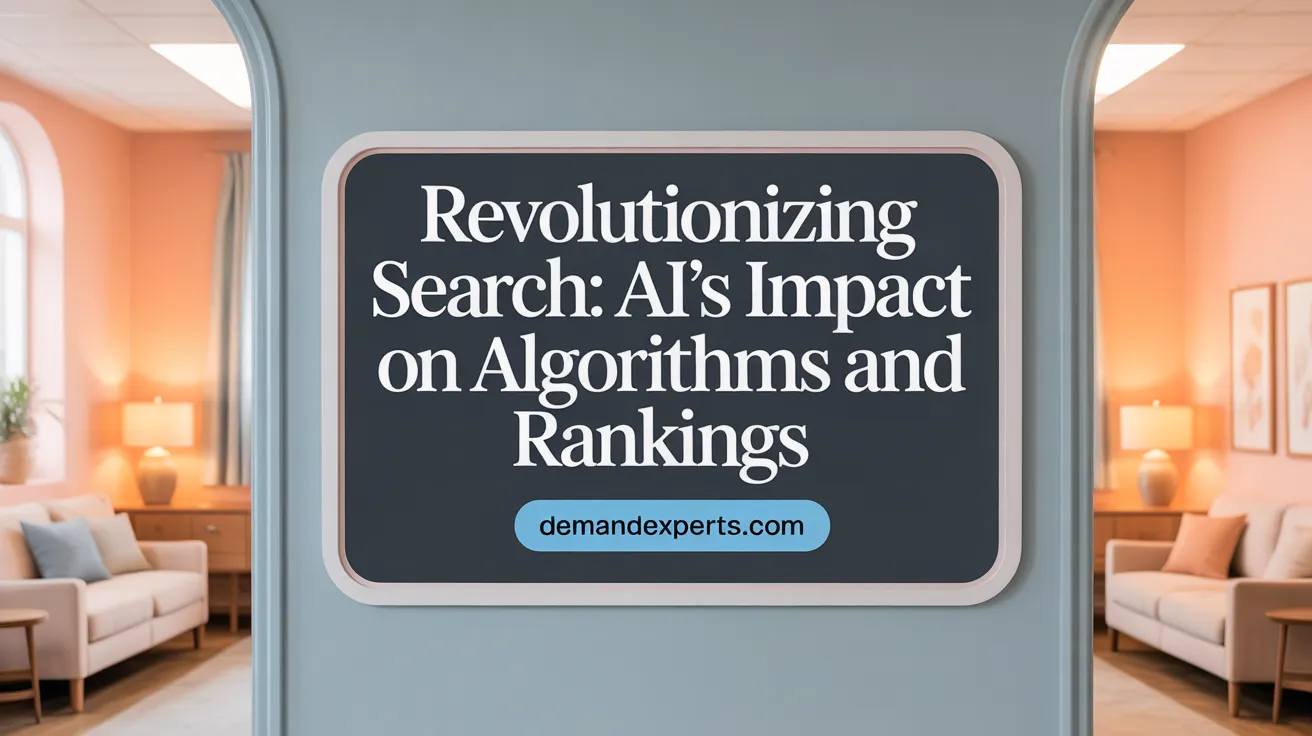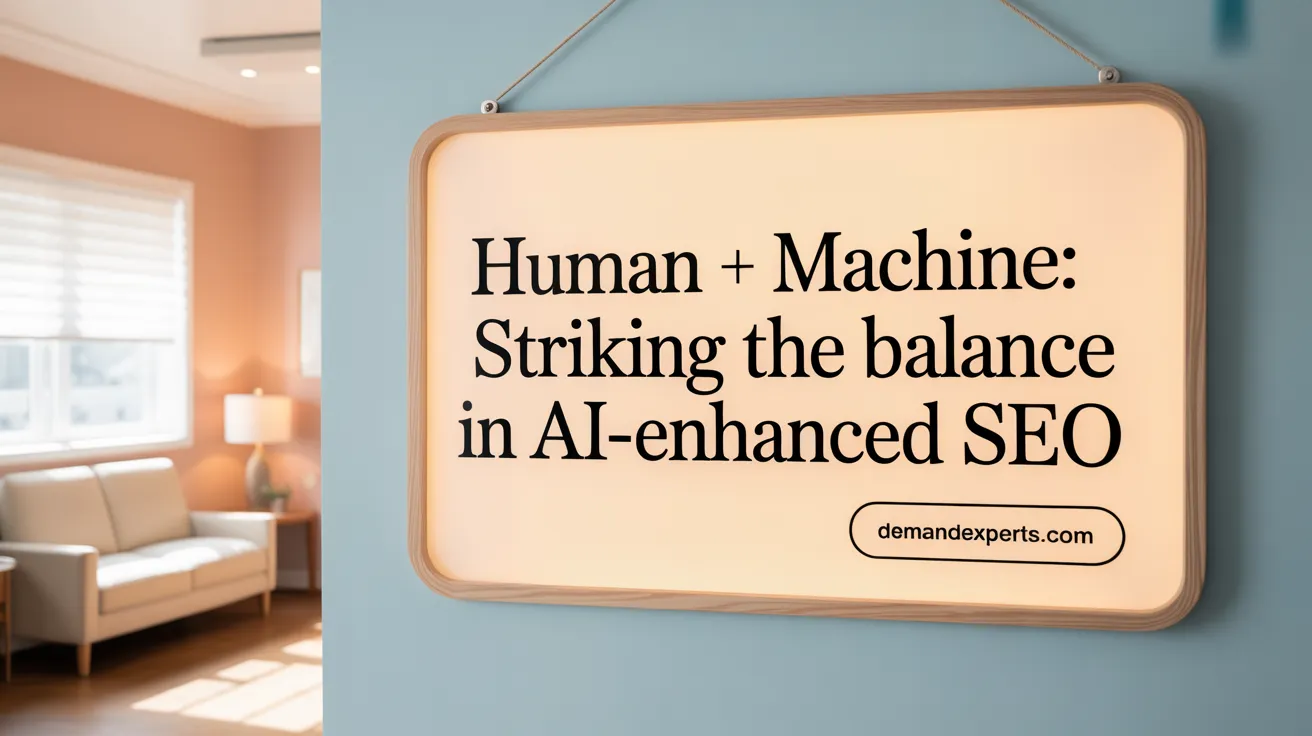Understanding the AI Transformation in SEO
Search Engine Optimization (SEO) is undergoing a profound transformation driven by artificial intelligence (AI). From revolutionizing search algorithms to reshaping content creation, AI is redefining the way businesses optimize for search engines and engage with users. This article explores how AI technologies are changing SEO strategies, impacting user behavior, and shaping the future landscape of digital marketing.
AI’s Role in Evolving SEO Strategies and Practices
How is AI transforming SEO strategies and practices?
AI is fundamentally changing how businesses approach SEO. With advanced algorithms like Google’s BERT and RankBrain, search engines now better grasp user intent and nuanced language, leading to more precise and relevant search results.
This technology enables sophisticated content optimization and keyword research, allowing marketers to uncover emerging trends early and craft content that meets the evolving needs of users. AI tools automate many SEO tasks such as technical site audits, keyword analysis, and link evaluation, increasing efficiency and accuracy.
Furthermore, recent innovations like Google’s Search Generative Experience (SGE) offer instant, AI-generated summaries at the top of search results, emphasizing the importance of authoritative, well-structured content. Overall, AI makes SEO more personalized and data-driven, focusing on delivering high-value, relevant experiences for users.
Use of AI in keyword research and predictive analytics
AI enhances keyword research by analyzing vast datasets, including social media signals, news coverage, and search patterns, to identify trending topics weeks before they peak. Predictive analytics further enable businesses to forecast future search behaviors, guiding content strategies.
These tools categorize keywords based on semantic relationships and user intent, simplifying the process of content planning and optimization. As a result, marketers can allocate resources more effectively and stay ahead of competition.
Automation in content creation and technical SEO
AI-powered content generation tools like GPT-4 facilitate rapid creation of high-quality, SEO-optimized articles, saving time without compromising quality. These tools assist in drafting, editing, and updating content to meet current algorithms and user needs.
In technical SEO, AI automates tasks such as detecting site issues, analyzing load speeds, and implementing schema markup. Automated alerts and real-time monitoring enable quick responses to algorithm changes, maintaining optimal site performance.
Personalization in SEO under AI influence
AI enables highly personalized search experiences by analyzing user behavior, preferences, location, and device usage. This personalization improves engagement by delivering content that aligns closely with individual user needs.
SEO strategies now focus on creating tailored content that resonates with specific audiences, improving rankings and authority.
Emergence of AI-powered search experiences
The rise of AI-based search interfaces, including conversational agents like ChatGPT and the integration of generative AI in search results, dramatically alters the landscape. These experiences offer instant answers and summaries, reducing reliance on traditional links.
To adapt, content creators must prioritize structured data, comprehensive topic coverage, and credible sources, ensuring their content is favored in AI summaries. This evolution encourages a shift towards authoritative, high-quality content optimized for AI-driven features.
The Impact of AI on Search Algorithms and Ranking Factors

How has AI advanced search algorithms?
AI has revolutionized search engines by enabling them to analyze and interpret the vast amounts of data more effectively. Technologies such as RankBrain, BERT, and MUM have made it possible for search engines to understand natural language, context, and user intent more deeply. These AI-driven algorithms facilitate a more nuanced comprehension of complex queries, providing users with more relevant and precise results.
How is the shift from keyword matching to semantic search affecting SEO?
Traditionally, SEO focused heavily on matching keywords. However, AI has shifted the focus toward understanding the meaning behind user queries. Semantic search allows search engines to interpret the intent and context rather than just matching keywords. This encourages content creators to produce comprehensive, high-quality content that answers user questions directly and thoroughly.
What role do machine learning models like RankBrain, BERT, and MUM play?
Models such as RankBrain, BERT, and MUM are fundamental to modern search. RankBrain uses machine learning to interpret unfamiliar words or phrases, improving relevance. BERT (Bidirectional Encoder Representations from Transformers) helps search engines understand the context of words in a sentence, leading to better interpretation of natural language. MUM (Multitask Unified Model) takes this further by analyzing multiple aspects of a query simultaneously and synthesizing information across languages and formats, significantly enhancing the capability to deliver accurate answers.
How is content quality assessed in the AI-driven search landscape?
AI emphasizes the importance of high-quality content that demonstrates expertise, authority, and trustworthiness—often summarized as the E-E-A-T principle. Search engines now prioritize original, well-researched, and authoritative content that provides real value to users. Structured data, recent updates, and genuine user engagement signals also influence rankings, as AI systems evaluate the reputation and reliability of content sources.
| AI Technologies | Function in Search | Impact on Rankings | Additional Notes |
|---|---|---|---|
| RankBrain | Interprets complex queries | Improves relevance for unfamiliar or ambiguous questions | Uses machine learning to adapt over time |
| BERT | Understands context within sentences | Enhances understanding of natural language, affecting ranking signals | Supports long-tail and conversational queries |
| MUM | Analyzes multi-format data | Provides more comprehensive, accurate results faster | Cross-lingual and cross-modal understanding |
This technological evolution illustrates a clear move toward search systems that prioritize user intent and experience over simple keyword matching. By leveraging AI, search engines are now better equipped to deliver personalized, relevant results that align with modern consumer expectations. As AI continues its progression, SEO strategies will increasingly focus on authoritative, well-structured, and high-quality content that satisfies the sophisticated understanding of user needs.
Current AI-Driven Tools and Technologies Shaping SEO
 AI is revolutionizing SEO through an array of sophisticated tools designed to streamline and enhance various optimization tasks. Leading SEO platforms such as Semrush, SE Ranking, Surfer SEO, and Frase incorporate AI-powered features that assist in comprehensive keyword research, content optimization, technical site audits, and performance tracking. These tools analyze large datasets to identify trending keywords, detect content gaps, and forecast future search patterns, giving businesses a competitive edge.
AI is revolutionizing SEO through an array of sophisticated tools designed to streamline and enhance various optimization tasks. Leading SEO platforms such as Semrush, SE Ranking, Surfer SEO, and Frase incorporate AI-powered features that assist in comprehensive keyword research, content optimization, technical site audits, and performance tracking. These tools analyze large datasets to identify trending keywords, detect content gaps, and forecast future search patterns, giving businesses a competitive edge.
In content creation and editing, AI-driven solutions like Jasper AI, Writesonic, and Copy.ai automate the drafting of SEO-friendly articles, generating high-quality content at a faster pace while maintaining relevance and readability. These systems utilize natural language processing (NLP) to refine tone, structure, and keyword placement, helping content creators meet the demands of modern search algorithms.
Technical audits are also enhanced by AI, with tools like Sitebulb and DeepCrawl automatically identifying technical issues such as site speed problems, crawl errors, and schema markup inaccuracies. AI's predictive analytics capabilities enable real-time monitoring and adjustment, ensuring sites stay optimized amidst changing search engine algorithms.
Backlink analysis has been transformed by AI through platforms like Ahrefs and SEMrush, which assess backlink quality, automate outreach efforts, and monitor competitor link profiles. This improves link-building strategies by focusing on authoritative sources and reducing spam links.
Natural language processing and predictive analytics are at the core of many AI SEO tools, helping engines better interpret user queries and anticipate future trends. These technologies enable more precise content targeting, personalized search results, and an overall more effective SEO strategy.
Overall, the integration of AI into SEO tools enhances efficiency, accuracy, and scalability, making data-driven decision-making accessible to digital marketers aiming to improve their online visibility in 2024 and beyond.
Emerging AI Trends and Future Predictions in SEO

What are the emerging trends and future predictions for AI in SEO?
The landscape of SEO is rapidly transforming due to advancements in artificial intelligence. One of the most noticeable trends is the increasing production of AI-generated content, which allows marketers to create high-quality, optimized articles, blogs, and multimedia at scale. These AI tools can analyze data, suggest relevant keywords, and even draft content, saving time while maintaining SEO effectiveness.
Voice and visual search are gaining ground thanks to AI-driven recognition technologies. Long-tail, conversational queries are becoming more common with virtual assistants like Alexa, Siri, and Google Assistant, influencing SEO strategies to focus on natural language, schema markup, and local SEO. Visual search using tools like Google Lens and Pinterest Lens opens new avenues for e-commerce and product discovery, making images a crucial part of SEO.
Predictive analytics, powered by AI, enable businesses to forecast search trends and user behaviors. This capacity to anticipate future demands helps create content aligned with upcoming interests, giving a competitive edge. AI-driven tools can sift through massive datasets to identify emerging keywords weeks before they surface in mainstream searches, thus optimizing content preemptively.
Integration of AI chatbots and conversational engines enhances user interaction, providing instant, relevant responses that reduce dependence on traditional link-based navigation. Google’s Search Generative Experience (SGE), now called AI Overviews, presents summarized, AI-generated answers at the top of search results, reshaping how users access information.
Looking ahead, the importance of AI in SEO will only grow. Autonomous campaign management, personalized search experiences, and AI-enhanced technical SEO audits will become standard practices. By 2025-2027, AI’s role will expand further, emphasizing contextually relevant, authoritative, and personalized content. Companies competing in this space should invest in AI-based tools, upskill their teams, and strike a balance between automation and human creativity to navigate this evolving environment effectively.
Artificial Intelligence's Influence on Content Creation and Optimization
How does artificial intelligence influence content creation and optimization in SEO?
Artificial intelligence (AI) plays a pivotal role in shaping modern SEO practices by transforming how content is created, optimized, and delivered to users. AI-powered tools like generative models such as ChatGPT and other large language models (LLMs) enable the automated production of high-quality, relevant content that aligns with user needs and search intent.
These tools help content creators generate ideas, draft articles, and refine messaging, significantly reducing the time required for content development while maintaining a high standard of relevance and readability. Moreover, AI algorithms—including Google’s RankBrain and BERT—advance search engines’ ability to comprehend the semantic meaning behind queries, emphasizing the importance of user intent over simple keyword matches.
In addition to content generation, AI automates vital SEO tasks, such as keyword research, site audits, and technical optimization. For example, AI-driven analytics identify content gaps, suggest trending keywords, and analyze competitor strategies, empowering marketers with data-driven insights. This automation allows for scaling efforts efficiently and responding rapidly to evolving search patterns.
Furthermore, AI enhances the personalization of search results, delivering tailored content based on user behavior, preferences, and location. Chatbots and AI-driven recommendation systems help improve user engagement and satisfaction by offering relevant information with minimal effort.
Despite these advancements, maintaining high standards of content quality and trustworthiness remains crucial. Google's recent updates emphasize original, authoritative, and trustworthy content—highlighting the importance of adhering to standards like E-E-A-T (Experience, Expertise, Authority, and Trustworthiness). Content that combines AI efficiency with human oversight to ensure authenticity and value will perform best in the increasingly AI-influenced SEO landscape.
In summary, AI dramatically reshapes SEO by automating content tasks, elevating relevance through semantic understanding, and personalizing user experiences. Its integration requires a balanced approach that leverages technology without compromising transparency and quality.
Changing Dynamics of User Search Behavior Due to AI
How has user search behavior evolved with AI advancements?
AI innovations have dramatically reshaped the way users search for information online. Traditionally, search involved entering specific keywords, hoping the search engine would match those keywords with relevant content. Now, this process is shifting towards more conversational and personalized interactions.
One of the biggest changes is the rise of AI chatbots and virtual assistants like ChatGPT, Siri, Alexa, and Google Assistant. These tools offer instant, synthesized answers that are tailored to user preferences, reducing the need for manual keyword searching and click-through navigation. Instead of sifting through multiple links, users are больше relying on these AI-driven sources for comprehensive responses.
Visual and multi-modal search methods are also gaining popularity. Tools such as Google Lens and Pinterest Lens allow users to upload images or use visual cues for discovery, making search more intuitive and engaging. This evolution supports a more seamless discovery process, especially in e-commerce and local search where images can convey rich context.
These shifts have significant implications for SEO and content creation. Content strategies now focus heavily on relevance, semantic understanding, and structured data to improve visibility in AI-powered results. The importance of high-quality, authoritative content aligned with AI algorithms' preferences has never been greater.
Overall, user search behavior has become faster, more natural, and deeply integrated with daily technology. Users expect instant, personalized responses across multiple platforms, leading to more efficient and engaging ways to find and consume information.
Strategic Adaptation for SEO in an AI-Driven Landscape
What strategic considerations should businesses have when adapting their SEO to AI developments?
In the rapidly evolving AI-enhanced search environment, businesses need to rethink their SEO strategies to stay competitive. One of the most critical aspects is emphasizing the creation of high-quality, authoritative content that complies with the E-E-A-T principles—expertise, experience, authority, and trustworthiness. This means producing original research, credible sources, and detailed, comprehensive content that demonstrates reliability.
Another essential factor is optimizing technical SEO elements. Enhancing site speed, mobile-friendliness, and ensuring proper schema markup helps AI models accurately interpret and rank content. Structured data and schema markup not only improve visibility in traditional search but also increase the chances of content being featured in AI-generated summaries or Overviews.
Content formatting should prioritize clarity and skimmability. Using clear headings, concise summaries, and key takeaways aids AI in understanding and highlighting content. Incorporating natural language, long-tail keywords, and conversational phrasing aligns with voice search trends and improves relevance for user queries.
Citations and references from reputable sources can significantly boost content trustworthiness. These references help AI systems assess content quality and increase the likelihood of being cited or featured in AI-generated responses.
Monitoring AI-specific metrics such as the influence of Large Language Models (LLMs) on referral traffic and the frequency of citations can help refine SEO strategies. Keeping abreast of emerging trends like the rise of visual and voice search ensures your content remains accessible and relevant.
Diversifying content formats, including videos and images optimized for visual search, is vital. These elements cater to new ways users seek information and can improve overall engagement.
Early adoption to these tactical approaches not only sustains search visibility but also builds resilience against shifting algorithms. Businesses that proactively align their SEO efforts with AI advancements will maintain better engagement and achieve long-term digital success.
Ethical Considerations in Applying AI to SEO

What ethical implications arise from using AI in search engine optimization?
The integration of AI into SEO introduces several ethical considerations that are essential to address for responsible digital marketing. Primarily, it demands transparency and accountability in how AI-driven tools and algorithms are employed. Users and content creators should be aware when AI influences search rankings or content generation processes, fostering trust and credibility.
One major concern is the potential spread of misinformation or biased content. Since AI systems learn from existing data, they can inadvertently reinforce biases or produce biased outputs. This risk emphasizes the importance of human oversight to review, validate, and ensure the fairness of AI-generated content.
Data privacy is another critical issue. AI tools often analyze vast amounts of user data to personalize results and improve relevance. Respecting user privacy rights and adhering to data protection laws is fundamental, especially when handling sensitive or proprietary information.
Intellectual property concerns also arise with AI-generated content. It's essential to verify that AI outputs do not infringe on copyrights or intellectual property rights, which could lead to legal complications.
To maintain ethical standards, organizations should establish clear governance structures for AI use in SEO. This includes setting policies for transparency, monitoring AI performance, and ensuring that outputs align with societal norms and legal regulations.
In conclusion, integrating AI into SEO necessitates a cautious approach anchored in ethical principles. Prioritizing transparency, fairness, and user privacy not only mitigates risks but also builds trust with audiences, ensuring that AI serves as a positive force in advancing digital marketing practices.
The Integral Role of AI in Voice Search Optimization
How does AI play a role in voice search, and what is its effect on SEO?
AI is central to the evolution of voice search, primarily through technologies like natural language processing (NLP) and speech recognition. These AI-driven tools enable search engines and virtual assistants such as Alexa, Google Assistant, and Siri to interpret spoken queries with high accuracy, understanding not just keywords but the intent and context behind user requests.
This advanced understanding allows AI algorithms to deliver highly relevant, conversational responses, greatly enhancing user satisfaction and engagement. For SEO, this means content must be optimized for natural language and long-tail, conversational keywords, aligning with how users naturally speak.
Implementing structured data, such as schema markup, further boosts visibility by helping AI systems recognize and extract key information. Marketers leverage AI-powered insights to craft voice-friendly content, monitor voice-specific performance metrics, and refine strategies in real time.
The rise of smart assistants and voice-activated devices has caused a significant shift in search behavior. Today, more users prefer speaking rather than typing queries, often seeking quick, concise answers for local, shopping, or informational needs.
This trend compels SEO efforts to move beyond traditional keyword stuffing towards creating comprehensive, semantically rich content that answers common questions, incorporates natural language, and optimizes for local search where voice queries are most impactful.
In summary, AI enhances the accuracy and relevance of voice search results and streamlines the process of aligning content with voice query patterns, positioning voice search optimization as a critical component of modern SEO strategies.
| Aspect | Role of AI | Impact on SEO |
|---|---|---|
| Natural Language Processing | Interprets conversational phrases | Enables content to match natural query flow |
| Speech Recognition | Converts speech into text | Facilitates accurate understanding of voice commands |
| Content Optimization | Recommends long-tail, conversational keywords | Guides creation of voice-friendly content |
| Structured Data Use | Enhances data visibility | Improves chances of being featured in voice answers |
| User Behavior Analytics | Tracks voice query trends | Helps develop targeted voice SEO strategies |
Growing adoption of smart devices and voice assistants is expected to see over 50% of searches being voice-based by 2025, emphasizing the importance of integrating AI-driven voice search tactics into SEO planning.
Technological Advances Driving AI’s SEO Revolution
What key technological advancements related to AI are influencing SEO practices today?
The rapid evolution of AI technologies has significantly changed how SEO strategies are developed and implemented. Central to this transformation are innovations in machine learning and natural language processing (NLP). These advancements allow search engines like Google to better understand the intent behind user queries and interpret the context of content, moving beyond simple keyword matching.
Google’s RankBrain and BERT are prime examples of AI-enhanced algorithms that have been integrated into core search functions since 2015. RankBrain uses machine learning to analyze and predict the relevance of search results, while BERT helps interpret the nuances of natural language, ensuring that what users want is accurately understood and delivered.
In addition to algorithmic improvements, AI-powered tools now automate many aspects of SEO. These include content optimization, technical audits, keyword research, and competitor analysis. Tools like SEMrush, Surfer SEO, and ChatGPT harness AI technologies to analyze large datasets, identify patterns, and suggest targeted strategies, improving efficiency and effectiveness.
A significant breakthrough is the advent of AI-generated search results, such as Google’s Search Generative Experience (SGE). These features generate instant summaries and direct answers, reducing the need for multiple clicks. They prioritize high-quality, relevant content that aligns with user intent, influencing content creation and optimization practices.
Furthermore, the rise of conversational AI and Large Language Models (LLMs) like ChatGPT and Google Bard has fostered a shift toward voice and long-tail search queries. These models enable more natural, human-like interactions, making conversational content and voice search optimization essential components of modern SEO.
In summary, continuous advancements in AI—spanning algorithm improvements, automation tools, generative content, and conversational technologies—are shaping the future of SEO. They enable more precise ranking algorithms, enhance user experiences, and compel marketers to adapt strategies that are more semantic, context-aware, and user-focused.
Balancing AI Automation with Human Creativity in SEO

Complementary roles of AI and human expertise
AI tools revolutionize SEO by handling data analysis, keyword research, and content automation efficiently. However, human expertise is essential for interpreting insights, crafting compelling narratives, and ensuring the strategic alignment of content. Together, they create a powerful synergy, where AI handles repetitive tasks and humans focus on creativity and emotional connection.
Ensuring content quality and originality
While AI can generate high-quality content quickly, maintaining originality and adhering to standards like E-E-A-T (Experience, Expertise, Authority, Trustworthiness) requires human input. Original research, industry insight, and credible sources must be incorporated to trustworthiness and relevance. Human oversight ensures content remains authentic and valuable.
Avoiding over-reliance on AI-generated content
Relying solely on AI risks producing generic, unoriginal material that may lack depth. Content creators should combine AI assistance with personal expertise, storytelling, and unique perspectives. This balance helps differentiate brands and build authority, rather than simply churning out SEO-optimized but low-quality content.
Human oversight in strategy and ethical compliance
Strategic decisions — including keyword targeting and content themes — benefit from human judgment. Additionally, humans are crucial for ethical oversight, ensuring AI-generated content avoids misinformation, biases, or inappropriate language. Implementing content reviews safeguards both brand integrity and user trust.
Harnessing AI to enhance creative SEO efforts
AI can inspire new ideas, optimize multimedia, and identify trending topics that align with audience interests. When used to augment human creativity, AI becomes a tool for innovation rather than a replacement. This combined approach elevates SEO efforts with engaging, relevant, and authoritative content.
| Aspect | Role of AI | Role of Humans | Why It Matters |
|---|---|---|---|
| Content Creation | Generate drafts, suggest keywords | Add personal insight, ensure originality | Maintains authenticity and engaging voice |
| Data Analysis | Detect patterns, forecast trends | Interpret insights, refine strategies | Aligns SEO with business goals |
| Ethical and Quality Checks | Flag potential issues, flag misinformation | Make final judgments, uphold standards | Protects brand reputation |
| Strategy Development | Identify opportunities, optimize schema | Make strategic decisions, ethical considerations | Ensures content meets audience needs |
Balancing AI efficiencies with human insight leads to smarter, more trustworthy SEO outcomes. As AI continues to evolve, the collaboration between human creativity and machine intelligence will be essential for sustainable success.
Preparing for the AI-Driven Future of SEO
AI is irrevocably changing the landscape of SEO by introducing intelligent automation, enhanced user understanding, and evolving search experiences. Businesses that embrace AI technologies while maintaining a strategic human touch will harness the full potential of these advancements. By focusing on high-quality, authoritative content and adapting to emerging AI-powered search modalities like voice and visual search, marketers can stay competitive and relevant. Ethical considerations remain paramount to sustain user trust in an AI-driven world. Ultimately, the future of SEO will be defined by the synergy between human creativity and AI innovation, offering smarter, more personalized, and efficient pathways for digital discovery.
References
- How AI Is Transforming The Future Of SEO - Forbes
- The Future of SEO: How AI Is Already Changing Search Engine ...
- The Death of SEO? How AI is Shaping The Future of SEO
- Future of SEO with AI: A Complete Analysis - EZ Rankings
- The Evolving Search Landscape: How AI is Changing SEO
- What Is AI SEO? How Artificial Intelligence Is Changing Search ...
- AI's Impact on SEO - Sperling Interactive
- SEO in the Age of AI: Impact of AI on SEO - WSI World
- AI Is Driving The Future Of SEO: How To Adapt - Forbes
- How AI is Changing SEO? | LeadOrigin
Understanding the AI Transformation in SEO
Search Engine Optimization (SEO) is undergoing a profound transformation driven by artificial intelligence (AI). From revolutionizing search algorithms to reshaping content creation, AI is redefining the way businesses optimize for search engines and engage with users. This article explores how AI technologies are changing SEO strategies, impacting user behavior, and shaping the future landscape of digital marketing.
AI’s Role in Evolving SEO Strategies and Practices
How is AI transforming SEO strategies and practices?
AI is fundamentally changing how businesses approach SEO. With advanced algorithms like Google’s BERT and RankBrain, search engines now better grasp user intent and nuanced language, leading to more precise and relevant search results.
This technology enables sophisticated content optimization and keyword research, allowing marketers to uncover emerging trends early and craft content that meets the evolving needs of users. AI tools automate many SEO tasks such as technical site audits, keyword analysis, and link evaluation, increasing efficiency and accuracy.
Furthermore, recent innovations like Google’s Search Generative Experience (SGE) offer instant, AI-generated summaries at the top of search results, emphasizing the importance of authoritative, well-structured content. Overall, AI makes SEO more personalized and data-driven, focusing on delivering high-value, relevant experiences for users.
Use of AI in keyword research and predictive analytics
AI enhances keyword research by analyzing vast datasets, including social media signals, news coverage, and search patterns, to identify trending topics weeks before they peak. Predictive analytics further enable businesses to forecast future search behaviors, guiding content strategies.
These tools categorize keywords based on semantic relationships and user intent, simplifying the process of content planning and optimization. As a result, marketers can allocate resources more effectively and stay ahead of competition.
Automation in content creation and technical SEO
AI-powered content generation tools like GPT-4 facilitate rapid creation of high-quality, SEO-optimized articles, saving time without compromising quality. These tools assist in drafting, editing, and updating content to meet current algorithms and user needs.
In technical SEO, AI automates tasks such as detecting site issues, analyzing load speeds, and implementing schema markup. Automated alerts and real-time monitoring enable quick responses to algorithm changes, maintaining optimal site performance.
Personalization in SEO under AI influence
AI enables highly personalized search experiences by analyzing user behavior, preferences, location, and device usage. This personalization improves engagement by delivering content that aligns closely with individual user needs.
SEO strategies now focus on creating tailored content that resonates with specific audiences, improving rankings and authority.
Emergence of AI-powered search experiences
The rise of AI-based search interfaces, including conversational agents like ChatGPT and the integration of generative AI in search results, dramatically alters the landscape. These experiences offer instant answers and summaries, reducing reliance on traditional links.
To adapt, content creators must prioritize structured data, comprehensive topic coverage, and credible sources, ensuring their content is favored in AI summaries. This evolution encourages a shift towards authoritative, high-quality content optimized for AI-driven features.
The Impact of AI on Search Algorithms and Ranking Factors

How has AI advanced search algorithms?
AI has revolutionized search engines by enabling them to analyze and interpret the vast amounts of data more effectively. Technologies such as RankBrain, BERT, and MUM have made it possible for search engines to understand natural language, context, and user intent more deeply. These AI-driven algorithms facilitate a more nuanced comprehension of complex queries, providing users with more relevant and precise results.
How is the shift from keyword matching to semantic search affecting SEO?
Traditionally, SEO focused heavily on matching keywords. However, AI has shifted the focus toward understanding the meaning behind user queries. Semantic search allows search engines to interpret the intent and context rather than just matching keywords. This encourages content creators to produce comprehensive, high-quality content that answers user questions directly and thoroughly.
What role do machine learning models like RankBrain, BERT, and MUM play?
Models such as RankBrain, BERT, and MUM are fundamental to modern search. RankBrain uses machine learning to interpret unfamiliar words or phrases, improving relevance. BERT (Bidirectional Encoder Representations from Transformers) helps search engines understand the context of words in a sentence, leading to better interpretation of natural language. MUM (Multitask Unified Model) takes this further by analyzing multiple aspects of a query simultaneously and synthesizing information across languages and formats, significantly enhancing the capability to deliver accurate answers.
How is content quality assessed in the AI-driven search landscape?
AI emphasizes the importance of high-quality content that demonstrates expertise, authority, and trustworthiness—often summarized as the E-E-A-T principle. Search engines now prioritize original, well-researched, and authoritative content that provides real value to users. Structured data, recent updates, and genuine user engagement signals also influence rankings, as AI systems evaluate the reputation and reliability of content sources.
| AI Technologies | Function in Search | Impact on Rankings | Additional Notes |
|---|---|---|---|
| RankBrain | Interprets complex queries | Improves relevance for unfamiliar or ambiguous questions | Uses machine learning to adapt over time |
| BERT | Understands context within sentences | Enhances understanding of natural language, affecting ranking signals | Supports long-tail and conversational queries |
| MUM | Analyzes multi-format data | Provides more comprehensive, accurate results faster | Cross-lingual and cross-modal understanding |
This technological evolution illustrates a clear move toward search systems that prioritize user intent and experience over simple keyword matching. By leveraging AI, search engines are now better equipped to deliver personalized, relevant results that align with modern consumer expectations. As AI continues its progression, SEO strategies will increasingly focus on authoritative, well-structured, and high-quality content that satisfies the sophisticated understanding of user needs.
Current AI-Driven Tools and Technologies Shaping SEO
 AI is revolutionizing SEO through an array of sophisticated tools designed to streamline and enhance various optimization tasks. Leading SEO platforms such as Semrush, SE Ranking, Surfer SEO, and Frase incorporate AI-powered features that assist in comprehensive keyword research, content optimization, technical site audits, and performance tracking. These tools analyze large datasets to identify trending keywords, detect content gaps, and forecast future search patterns, giving businesses a competitive edge.
AI is revolutionizing SEO through an array of sophisticated tools designed to streamline and enhance various optimization tasks. Leading SEO platforms such as Semrush, SE Ranking, Surfer SEO, and Frase incorporate AI-powered features that assist in comprehensive keyword research, content optimization, technical site audits, and performance tracking. These tools analyze large datasets to identify trending keywords, detect content gaps, and forecast future search patterns, giving businesses a competitive edge.
In content creation and editing, AI-driven solutions like Jasper AI, Writesonic, and Copy.ai automate the drafting of SEO-friendly articles, generating high-quality content at a faster pace while maintaining relevance and readability. These systems utilize natural language processing (NLP) to refine tone, structure, and keyword placement, helping content creators meet the demands of modern search algorithms.
Technical audits are also enhanced by AI, with tools like Sitebulb and DeepCrawl automatically identifying technical issues such as site speed problems, crawl errors, and schema markup inaccuracies. AI's predictive analytics capabilities enable real-time monitoring and adjustment, ensuring sites stay optimized amidst changing search engine algorithms.
Backlink analysis has been transformed by AI through platforms like Ahrefs and SEMrush, which assess backlink quality, automate outreach efforts, and monitor competitor link profiles. This improves link-building strategies by focusing on authoritative sources and reducing spam links.
Natural language processing and predictive analytics are at the core of many AI SEO tools, helping engines better interpret user queries and anticipate future trends. These technologies enable more precise content targeting, personalized search results, and an overall more effective SEO strategy.
Overall, the integration of AI into SEO tools enhances efficiency, accuracy, and scalability, making data-driven decision-making accessible to digital marketers aiming to improve their online visibility in 2024 and beyond.
Emerging AI Trends and Future Predictions in SEO

What are the emerging trends and future predictions for AI in SEO?
The landscape of SEO is rapidly transforming due to advancements in artificial intelligence. One of the most noticeable trends is the increasing production of AI-generated content, which allows marketers to create high-quality, optimized articles, blogs, and multimedia at scale. These AI tools can analyze data, suggest relevant keywords, and even draft content, saving time while maintaining SEO effectiveness.
Voice and visual search are gaining ground thanks to AI-driven recognition technologies. Long-tail, conversational queries are becoming more common with virtual assistants like Alexa, Siri, and Google Assistant, influencing SEO strategies to focus on natural language, schema markup, and local SEO. Visual search using tools like Google Lens and Pinterest Lens opens new avenues for e-commerce and product discovery, making images a crucial part of SEO.
Predictive analytics, powered by AI, enable businesses to forecast search trends and user behaviors. This capacity to anticipate future demands helps create content aligned with upcoming interests, giving a competitive edge. AI-driven tools can sift through massive datasets to identify emerging keywords weeks before they surface in mainstream searches, thus optimizing content preemptively.
Integration of AI chatbots and conversational engines enhances user interaction, providing instant, relevant responses that reduce dependence on traditional link-based navigation. Google’s Search Generative Experience (SGE), now called AI Overviews, presents summarized, AI-generated answers at the top of search results, reshaping how users access information.
Looking ahead, the importance of AI in SEO will only grow. Autonomous campaign management, personalized search experiences, and AI-enhanced technical SEO audits will become standard practices. By 2025-2027, AI’s role will expand further, emphasizing contextually relevant, authoritative, and personalized content. Companies competing in this space should invest in AI-based tools, upskill their teams, and strike a balance between automation and human creativity to navigate this evolving environment effectively.
Artificial Intelligence's Influence on Content Creation and Optimization
How does artificial intelligence influence content creation and optimization in SEO?
Artificial intelligence (AI) plays a pivotal role in shaping modern SEO practices by transforming how content is created, optimized, and delivered to users. AI-powered tools like generative models such as ChatGPT and other large language models (LLMs) enable the automated production of high-quality, relevant content that aligns with user needs and search intent.
These tools help content creators generate ideas, draft articles, and refine messaging, significantly reducing the time required for content development while maintaining a high standard of relevance and readability. Moreover, AI algorithms—including Google’s RankBrain and BERT—advance search engines’ ability to comprehend the semantic meaning behind queries, emphasizing the importance of user intent over simple keyword matches.
In addition to content generation, AI automates vital SEO tasks, such as keyword research, site audits, and technical optimization. For example, AI-driven analytics identify content gaps, suggest trending keywords, and analyze competitor strategies, empowering marketers with data-driven insights. This automation allows for scaling efforts efficiently and responding rapidly to evolving search patterns.
Furthermore, AI enhances the personalization of search results, delivering tailored content based on user behavior, preferences, and location. Chatbots and AI-driven recommendation systems help improve user engagement and satisfaction by offering relevant information with minimal effort.
Despite these advancements, maintaining high standards of content quality and trustworthiness remains crucial. Google's recent updates emphasize original, authoritative, and trustworthy content—highlighting the importance of adhering to standards like E-E-A-T (Experience, Expertise, Authority, and Trustworthiness). Content that combines AI efficiency with human oversight to ensure authenticity and value will perform best in the increasingly AI-influenced SEO landscape.
In summary, AI dramatically reshapes SEO by automating content tasks, elevating relevance through semantic understanding, and personalizing user experiences. Its integration requires a balanced approach that leverages technology without compromising transparency and quality.
Changing Dynamics of User Search Behavior Due to AI
How has user search behavior evolved with AI advancements?
AI innovations have dramatically reshaped the way users search for information online. Traditionally, search involved entering specific keywords, hoping the search engine would match those keywords with relevant content. Now, this process is shifting towards more conversational and personalized interactions.
One of the biggest changes is the rise of AI chatbots and virtual assistants like ChatGPT, Siri, Alexa, and Google Assistant. These tools offer instant, synthesized answers that are tailored to user preferences, reducing the need for manual keyword searching and click-through navigation. Instead of sifting through multiple links, users are больше relying on these AI-driven sources for comprehensive responses.
Visual and multi-modal search methods are also gaining popularity. Tools such as Google Lens and Pinterest Lens allow users to upload images or use visual cues for discovery, making search more intuitive and engaging. This evolution supports a more seamless discovery process, especially in e-commerce and local search where images can convey rich context.
These shifts have significant implications for SEO and content creation. Content strategies now focus heavily on relevance, semantic understanding, and structured data to improve visibility in AI-powered results. The importance of high-quality, authoritative content aligned with AI algorithms' preferences has never been greater.
Overall, user search behavior has become faster, more natural, and deeply integrated with daily technology. Users expect instant, personalized responses across multiple platforms, leading to more efficient and engaging ways to find and consume information.
Strategic Adaptation for SEO in an AI-Driven Landscape
What strategic considerations should businesses have when adapting their SEO to AI developments?
In the rapidly evolving AI-enhanced search environment, businesses need to rethink their SEO strategies to stay competitive. One of the most critical aspects is emphasizing the creation of high-quality, authoritative content that complies with the E-E-A-T principles—expertise, experience, authority, and trustworthiness. This means producing original research, credible sources, and detailed, comprehensive content that demonstrates reliability.
Another essential factor is optimizing technical SEO elements. Enhancing site speed, mobile-friendliness, and ensuring proper schema markup helps AI models accurately interpret and rank content. Structured data and schema markup not only improve visibility in traditional search but also increase the chances of content being featured in AI-generated summaries or Overviews.
Content formatting should prioritize clarity and skimmability. Using clear headings, concise summaries, and key takeaways aids AI in understanding and highlighting content. Incorporating natural language, long-tail keywords, and conversational phrasing aligns with voice search trends and improves relevance for user queries.
Citations and references from reputable sources can significantly boost content trustworthiness. These references help AI systems assess content quality and increase the likelihood of being cited or featured in AI-generated responses.
Monitoring AI-specific metrics such as the influence of Large Language Models (LLMs) on referral traffic and the frequency of citations can help refine SEO strategies. Keeping abreast of emerging trends like the rise of visual and voice search ensures your content remains accessible and relevant.
Diversifying content formats, including videos and images optimized for visual search, is vital. These elements cater to new ways users seek information and can improve overall engagement.
Early adoption to these tactical approaches not only sustains search visibility but also builds resilience against shifting algorithms. Businesses that proactively align their SEO efforts with AI advancements will maintain better engagement and achieve long-term digital success.
Ethical Considerations in Applying AI to SEO

What ethical implications arise from using AI in search engine optimization?
The integration of AI into SEO introduces several ethical considerations that are essential to address for responsible digital marketing. Primarily, it demands transparency and accountability in how AI-driven tools and algorithms are employed. Users and content creators should be aware when AI influences search rankings or content generation processes, fostering trust and credibility.
One major concern is the potential spread of misinformation or biased content. Since AI systems learn from existing data, they can inadvertently reinforce biases or produce biased outputs. This risk emphasizes the importance of human oversight to review, validate, and ensure the fairness of AI-generated content.
Data privacy is another critical issue. AI tools often analyze vast amounts of user data to personalize results and improve relevance. Respecting user privacy rights and adhering to data protection laws is fundamental, especially when handling sensitive or proprietary information.
Intellectual property concerns also arise with AI-generated content. It's essential to verify that AI outputs do not infringe on copyrights or intellectual property rights, which could lead to legal complications.
To maintain ethical standards, organizations should establish clear governance structures for AI use in SEO. This includes setting policies for transparency, monitoring AI performance, and ensuring that outputs align with societal norms and legal regulations.
In conclusion, integrating AI into SEO necessitates a cautious approach anchored in ethical principles. Prioritizing transparency, fairness, and user privacy not only mitigates risks but also builds trust with audiences, ensuring that AI serves as a positive force in advancing digital marketing practices.
The Integral Role of AI in Voice Search Optimization
How does AI play a role in voice search, and what is its effect on SEO?
AI is central to the evolution of voice search, primarily through technologies like natural language processing (NLP) and speech recognition. These AI-driven tools enable search engines and virtual assistants such as Alexa, Google Assistant, and Siri to interpret spoken queries with high accuracy, understanding not just keywords but the intent and context behind user requests.
This advanced understanding allows AI algorithms to deliver highly relevant, conversational responses, greatly enhancing user satisfaction and engagement. For SEO, this means content must be optimized for natural language and long-tail, conversational keywords, aligning with how users naturally speak.
Implementing structured data, such as schema markup, further boosts visibility by helping AI systems recognize and extract key information. Marketers leverage AI-powered insights to craft voice-friendly content, monitor voice-specific performance metrics, and refine strategies in real time.
The rise of smart assistants and voice-activated devices has caused a significant shift in search behavior. Today, more users prefer speaking rather than typing queries, often seeking quick, concise answers for local, shopping, or informational needs.
This trend compels SEO efforts to move beyond traditional keyword stuffing towards creating comprehensive, semantically rich content that answers common questions, incorporates natural language, and optimizes for local search where voice queries are most impactful.
In summary, AI enhances the accuracy and relevance of voice search results and streamlines the process of aligning content with voice query patterns, positioning voice search optimization as a critical component of modern SEO strategies.
| Aspect | Role of AI | Impact on SEO |
|---|---|---|
| Natural Language Processing | Interprets conversational phrases | Enables content to match natural query flow |
| Speech Recognition | Converts speech into text | Facilitates accurate understanding of voice commands |
| Content Optimization | Recommends long-tail, conversational keywords | Guides creation of voice-friendly content |
| Structured Data Use | Enhances data visibility | Improves chances of being featured in voice answers |
| User Behavior Analytics | Tracks voice query trends | Helps develop targeted voice SEO strategies |
Growing adoption of smart devices and voice assistants is expected to see over 50% of searches being voice-based by 2025, emphasizing the importance of integrating AI-driven voice search tactics into SEO planning.
Technological Advances Driving AI’s SEO Revolution
What key technological advancements related to AI are influencing SEO practices today?
The rapid evolution of AI technologies has significantly changed how SEO strategies are developed and implemented. Central to this transformation are innovations in machine learning and natural language processing (NLP). These advancements allow search engines like Google to better understand the intent behind user queries and interpret the context of content, moving beyond simple keyword matching.
Google’s RankBrain and BERT are prime examples of AI-enhanced algorithms that have been integrated into core search functions since 2015. RankBrain uses machine learning to analyze and predict the relevance of search results, while BERT helps interpret the nuances of natural language, ensuring that what users want is accurately understood and delivered.
In addition to algorithmic improvements, AI-powered tools now automate many aspects of SEO. These include content optimization, technical audits, keyword research, and competitor analysis. Tools like SEMrush, Surfer SEO, and ChatGPT harness AI technologies to analyze large datasets, identify patterns, and suggest targeted strategies, improving efficiency and effectiveness.
A significant breakthrough is the advent of AI-generated search results, such as Google’s Search Generative Experience (SGE). These features generate instant summaries and direct answers, reducing the need for multiple clicks. They prioritize high-quality, relevant content that aligns with user intent, influencing content creation and optimization practices.
Furthermore, the rise of conversational AI and Large Language Models (LLMs) like ChatGPT and Google Bard has fostered a shift toward voice and long-tail search queries. These models enable more natural, human-like interactions, making conversational content and voice search optimization essential components of modern SEO.
In summary, continuous advancements in AI—spanning algorithm improvements, automation tools, generative content, and conversational technologies—are shaping the future of SEO. They enable more precise ranking algorithms, enhance user experiences, and compel marketers to adapt strategies that are more semantic, context-aware, and user-focused.
Balancing AI Automation with Human Creativity in SEO

Complementary roles of AI and human expertise
AI tools revolutionize SEO by handling data analysis, keyword research, and content automation efficiently. However, human expertise is essential for interpreting insights, crafting compelling narratives, and ensuring the strategic alignment of content. Together, they create a powerful synergy, where AI handles repetitive tasks and humans focus on creativity and emotional connection.
Ensuring content quality and originality
While AI can generate high-quality content quickly, maintaining originality and adhering to standards like E-E-A-T (Experience, Expertise, Authority, Trustworthiness) requires human input. Original research, industry insight, and credible sources must be incorporated to trustworthiness and relevance. Human oversight ensures content remains authentic and valuable.
Avoiding over-reliance on AI-generated content
Relying solely on AI risks producing generic, unoriginal material that may lack depth. Content creators should combine AI assistance with personal expertise, storytelling, and unique perspectives. This balance helps differentiate brands and build authority, rather than simply churning out SEO-optimized but low-quality content.
Human oversight in strategy and ethical compliance
Strategic decisions — including keyword targeting and content themes — benefit from human judgment. Additionally, humans are crucial for ethical oversight, ensuring AI-generated content avoids misinformation, biases, or inappropriate language. Implementing content reviews safeguards both brand integrity and user trust.
Harnessing AI to enhance creative SEO efforts
AI can inspire new ideas, optimize multimedia, and identify trending topics that align with audience interests. When used to augment human creativity, AI becomes a tool for innovation rather than a replacement. This combined approach elevates SEO efforts with engaging, relevant, and authoritative content.
| Aspect | Role of AI | Role of Humans | Why It Matters |
|---|---|---|---|
| Content Creation | Generate drafts, suggest keywords | Add personal insight, ensure originality | Maintains authenticity and engaging voice |
| Data Analysis | Detect patterns, forecast trends | Interpret insights, refine strategies | Aligns SEO with business goals |
| Ethical and Quality Checks | Flag potential issues, flag misinformation | Make final judgments, uphold standards | Protects brand reputation |
| Strategy Development | Identify opportunities, optimize schema | Make strategic decisions, ethical considerations | Ensures content meets audience needs |
Balancing AI efficiencies with human insight leads to smarter, more trustworthy SEO outcomes. As AI continues to evolve, the collaboration between human creativity and machine intelligence will be essential for sustainable success.
Preparing for the AI-Driven Future of SEO
AI is irrevocably changing the landscape of SEO by introducing intelligent automation, enhanced user understanding, and evolving search experiences. Businesses that embrace AI technologies while maintaining a strategic human touch will harness the full potential of these advancements. By focusing on high-quality, authoritative content and adapting to emerging AI-powered search modalities like voice and visual search, marketers can stay competitive and relevant. Ethical considerations remain paramount to sustain user trust in an AI-driven world. Ultimately, the future of SEO will be defined by the synergy between human creativity and AI innovation, offering smarter, more personalized, and efficient pathways for digital discovery.
References
- How AI Is Transforming The Future Of SEO - Forbes
- The Future of SEO: How AI Is Already Changing Search Engine ...
- The Death of SEO? How AI is Shaping The Future of SEO
- Future of SEO with AI: A Complete Analysis - EZ Rankings
- The Evolving Search Landscape: How AI is Changing SEO
- What Is AI SEO? How Artificial Intelligence Is Changing Search ...
- AI's Impact on SEO - Sperling Interactive
- SEO in the Age of AI: Impact of AI on SEO - WSI World
- AI Is Driving The Future Of SEO: How To Adapt - Forbes
- How AI is Changing SEO? | LeadOrigin






